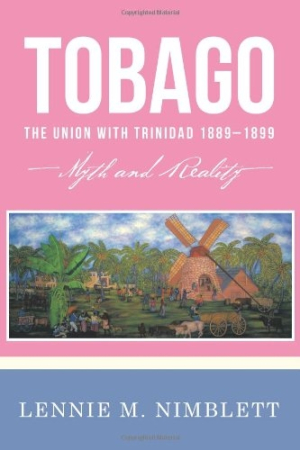Tobago
The Union with Trinidad 1889-1899
The tiny West Indies island of Tobago is a “political football” that changed hands forty times in four centuries. According to one of its former governors, Tobago fell into a state of “squalor and depravity,” so much so that he recommended it be abandoned and its nineteen thousand inhabitants be relocated to the neighboring island of Trinidad. Historian and political commentator Lennie M. Nimblett explains that if not for a union with its neighbor as brokered near the end of Queen Victoria’s reign, Tobago might today be a deserted island.
Nimblett wrote Tobago: The Union with Trinidad 1889-1899 to correct “woolly ideas about the union” with Trinidad and myths the people of Tobago hold about how and why their country was formed. Drawing upon a wealth of obscure historical documents, many of them presented in whole or in part in the book, Nimblett tries to show how “a failed British slave colony” was saved from extinction through a merger with its more prosperous and better-run neighbor.
The author agrees with those in Tobago who claim that the agreement between the two islands was, and in many ways still is, an unequal union. Nimblett notes, however, that the inequality works both ways. He quotes a former governor who explains that while many in Tobago talk of seceding from Trinidad, it is the larger island that has more cause for such a division. Tobago, according to Nimblett and the sources he cites, has had the better part, especially economically, of this arrangement foisted upon Trinidad by the British.
However, educationally, economically, and politically, Tobago is not much better than the “colonial slum” it was dubbed by a visitor during the imperial era. Its inhabitants have long lived in a state of continuous turmoil, explains Nimblett. For four centuries, Tobago was a battlefield and bastion of Spanish, Dutch, English, French, Swedish, Courlander, and buccaneer masters. Today it suffers from economic hardship and the absence of any “political sense of self-awareness.” More than ninety-six percent of the people on Tobago are descendants of African slaves. Their station is not much advanced from that of their forebears, argues Nimblett. They are still ruled by what he terms “mini-kings” and a tiny parliament whose members are appointed by an even smaller autocracy.
The research Nimblett undertakes is impressive. Two indices, three appendices, four maps, five pages of sources, and twenty-four illustrations support and enliven what could have been a very dry treatise on an obscure subject of almost exclusively local interest. While the book’s audience is limited, and many of Nimblett’s citations are repetitive, Tobago is a valuable work.
What Nimblett has artfully assembled is a colorful history of the two islands as well as a look into the politics, prejudices, and practices of the British Empire in its heyday—and the few pluses and many minuses of that legacy.
Reviewed by
Mark McLaughlin
Disclosure: This article is not an endorsement, but a review. The publisher of this book provided free copies of the book and paid a small fee to have their book reviewed by a professional reviewer. Foreword Reviews and Clarion Reviews make no guarantee that the publisher will receive a positive review. Foreword Magazine, Inc. is disclosing this in accordance with the Federal Trade Commission’s 16 CFR, Part 255.

